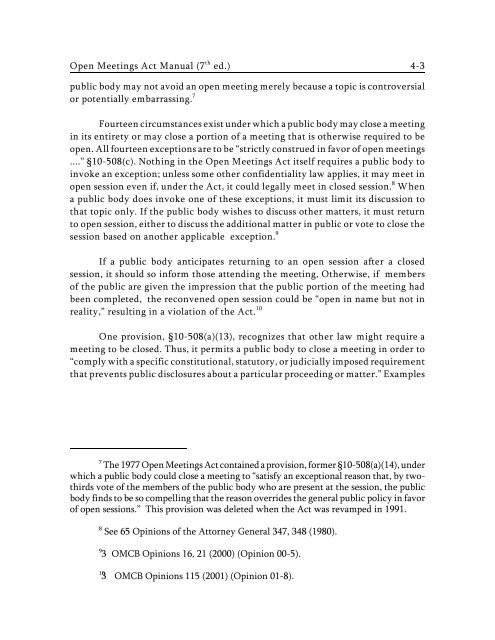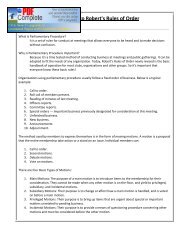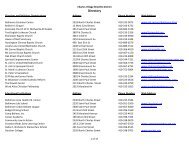Chapter 4 Open and Closed Meetings - Maryland Attorney General
Chapter 4 Open and Closed Meetings - Maryland Attorney General
Chapter 4 Open and Closed Meetings - Maryland Attorney General
Create successful ePaper yourself
Turn your PDF publications into a flip-book with our unique Google optimized e-Paper software.
th<strong>Open</strong> <strong>Meetings</strong> Act Manual (7 ed.) 4-3public body may not avoid an open meeting merely because a topic is controversialor potentially embarrassing. 7Fourteen circumstances exist under which a public body may close a meetingin its entirety or may close a portion of a meeting that is otherwise required to beopen. All fourteen exceptions are to be “strictly construed in favor of open meetings....” §10-508(c). Nothing in the <strong>Open</strong> <strong>Meetings</strong> Act itself requires a public body toinvoke an exception; unless some other confidentiality law applies, it may meet in8open session even if, under the Act, it could legally meet in closed session. Whena public body does invoke one of these exceptions, it must limit its discussion tothat topic only. If the public body wishes to discuss other matters, it must returnto open session, either to discuss the additional matter in public or vote to close the9session based on another applicable exception.If a public body anticipates returning to an open session after a closedsession, it should so inform those attending the meeting, Otherwise, if membersof the public are given the impression that the public portion of the meeting hadbeen completed, the reconvened open session could be “open in name but not inreality,” resulting in a violation of the Act. 10One provision, §10-508(a)(13), recognizes that other law might require ameeting to be closed. Thus, it permits a public body to close a meeting in order to“comply with a specific constitutional, statutory, or judicially imposed requirementthat prevents public disclosures about a particular proceeding or matter.” Examples7The 1977 <strong>Open</strong> <strong>Meetings</strong> Act contained a provision, former §10-508(a)(14), underwhich a public body could close a meeting to “satisfy an exceptional reason that, by twothirdsvote of the members of the public body who are present at the session, the publicbody finds to be so compelling that the reason overrides the general public policy in favorof open sessions.” This provision was deleted when the Act was revamped in 1991.8See 65 Opinions of the <strong>Attorney</strong> <strong>General</strong> 347, 348 (1980).93 OMCB Opinions 16, 21 (2000) (Opinion 00-5).103 OMCB Opinions 115 (2001) (Opinion 01-8).







